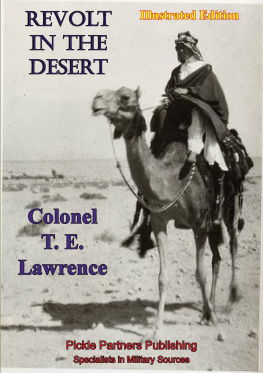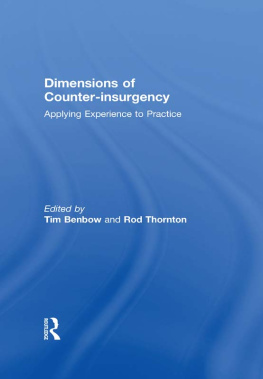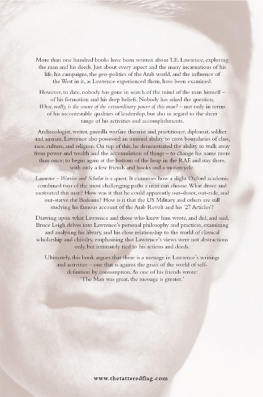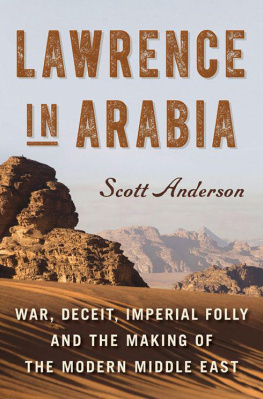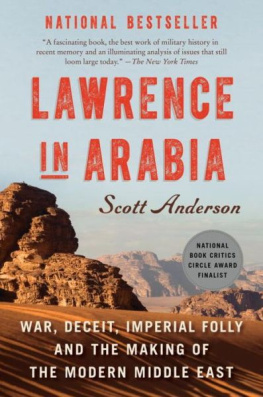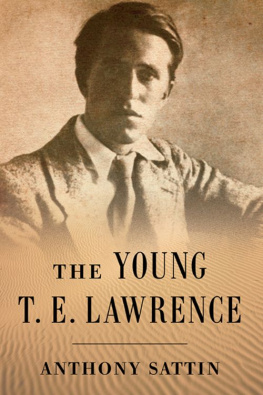Title Page
ASYMMETRIC WARFARE FOR ENTREPRENEURS
120 LESSONS FROM LAWRENCE OF ARABIA
By
Luan Hanratty
Publisher Information
First edition published in 2011
Published in the UK by MX Publishing
335 Princess Park Manor, Royal Drive, London, N11 3GX
www.mxpublishing.co.uk
Digital edition converted and
Distributed in 2011 by
Andrews UK Limited 2011
www.andrewsuk.com
Luan Hanratty Copyright 2011
The right of Luan Hanratty to be identified as the author of this work has been asserted by him in accordance with the Copyright, Designs and Patents Act 1998.
All rights reserved. No reproduction, copy or transmission of this publication may be made without express prior written permission. No paragraph of this publication may be reproduced, copied or transmitted except with express prior written permission or in accordance with the provisions of the Copyright Act 1956 (as amended). Any person who commits any unauthorised act in relation to this publication may be liable to criminal prosecution and civil claims for damage.
Although every effort has been made to ensure the accuracy of the information contained in this book, as of the date of publication, nothing herein should be construed as giving advice. The opinions expressed herein are those of the author and not of MX Publishing.
Cover design by
www.staunch.com
Dedication
To Lesley
Preface
Asymmetric Warfare for Entrepreneurs: 120 Lessons from Lawrence of Arabia is a deconstruction and analysis of TE Lawrences epic text on warfare, Seven Pillars of Wisdom: A Triumph (published in 1926). T.E Lawrence was a man of incredible intellect and courage. He was world-renowned in his own lifetime and the account of his leadership during the Arab Revolt is a beautifully-written narrative. The Seven Pillars is a showcase of modernist literature articulating ideas lucidly and highlighting the wranglings incessant in the human condition in adversity. It is also a classic military theory, making it the staple handbook for revolutionaries and irregular insurgencies ever since.
To put it simply, asymmetric warfare is where the little guy wins. It is a situation where the insurgent uses his weakness as a strength and exploits his enemys size and strength as a weakness. This is done to level the playing field and fight on even terms. Learning and utilising this type of conflict is invaluable for entrepreneurs. If we look at firms who are highly dominant in their industries, they have almost always started from positions of obscurity. But they have risen rapidly and taken a stranglehold over the market by being ahead of the curve and being smart in the ways they attack.
The analogy between war and business is a tight one. This book demonstrates how the ancient art of war, in particular guerrilla war, is applicable to the modern world of business, marketing, leadership and negotiation. I have articulated my philosophy of business through Lawrences philosophy of war. I have also used other revolutionary thinkers including Sun Zi, Machiavelli, Nietzsche, Henry Ford and Richard Branson to elucidate my ideas.
But it is Lawrence who is the real inspiration for the book. He spent two years fighting alongside the Arabs in a side theatre of the First World War lasting from 1916 to 1918. The Arabs were struggling to achieve independence from the Ottoman Empire which was a 500-year old construct that had become stale and immobile, just as markets do. This was the cue for new players like Lawrence to come in and tear up the rule book.
In addition to this, he was the consummate cross cultural integrator and a model to any expatriate worker. The following quote regarding the scarcity of water in the desert sums up his exemplary attitude.
As my ambition was to avoid comment upon my difference, I copied them, trusting with reason that their physical superiority was not great enough to trap me into serious harm. Actually I only once went ill with thirst.
Lawrence succeeded in such an unlikely environment because he was willing to do the illogical hard stuff in order to be both a good sport and an easy adapter. He was keen to prove that he was a valuable member of the team rather than an inexperienced and inept outsider. He spoke Arabic in various dialects with keen fluidity and at times, for show, behaved more like the locals than they did, even if that was contrary to his western ways. This resulted in seamless integration and complete admiration from his cohorts. He mixed the best of both worlds. He combined his western know-how and education with easy acceptance of different customs and behavioural codes and his pragmatism is an example for all international business people today.
TE Lawrence The Ghost in the Machine
TE Lawrence was the archetypal revolutionary. He was an enigma and trailblazer quite unlike his peers. An illegitimate child from middle class England, he gained a place at Oxford by sheer dint of his intelligence. Then after graduating and inspired by earlier travellers and ethnographers such as Gertrude Bell and Charles Doughty, he took a post with the Colonial Office in the Middle East where he worked as an archaeologist, studying and mapping the ancient biblical lands which had long fascinated him. During this time Lawrence gained an intimate knowledge of the region and when war broke out in 1916 he was in the perfect position to take a leading role in the Arab uprising against the Ottoman Turks.
Lawrences job was to act as a bridge between the Imperial British forces based in Cairo and the Arab royalty in Mecca. It was from this toehold that he managed to galvanize and lead the revolt, turning it from a disorganised confederation of tribes into a ruthlessly efficient irregular army. Under Lawrences stewardship the Arabs harried and hit the Turks until they were completely expelled from the Arabian Peninsula.
Arab success had started as a distant and doubtful flicker of hope. Two years later, the movement had grown in confidence to the point where independence was unquestionably theirs. Likewise Lawrence grew with the revolt. At the age of twenty seven he was a curious dilettante adventurer but as the campaign gathered momentum Lawrence developed a deep realisation and commitment to Arab self-determination. By the end of the war he was a hardened guerrilla general, intolerant of weakness and entirely comfortable in leadership. However, the glory was tarnished by a deep sense of guilt over European ambitions to subjugate the Arab world after the conclusion of the war and he never really forgave himself for manipulating them in this way.
Lawrence was a man of intriguing personality. He was persuasive, intelligent, cocky, charming, driven, fair, egotistical, ambitious, scheming, shrewd, proud and quick. But there was a darker side to his character. Lawrence was an existentialist who felt very much constrained by his physical being. He often toyed with the idea of killing himself. He was a masochist: personally brave to the extreme, caring far more for his men than he did of himself. He loved pain and perhaps, perhaps he did indeed intend to kill himself when he took his motor cycle out for the last time in 1935. The following passage where he contemplates the futility of life and war embodies his nihilistic attitude.
To be of the desert was, as they [the Arabs] knew, a doom to wage unending battle with an enemy who was not of the world, nor life, nor anything, but hope itself; and failure seemed Gods freedom to mankind. We might only exercise this our freedom by not doing what it lay within our power to do, for then life would belong to us, and we should have mastered it by holding it cheap. Death would seem best of all our works, the last free loyalty within our grasp, our final leisure: and of these two poles, death and life, or, less finally, leisure and subsistence, we should shun subsistence (which was the stuff of life) in all save its faintest degree, and cling close to leisure. Thereby we would serve to promote the not-doing rather than the doing. Some men, there might be, uncreative; whose leisure was barren; but the activity of these would have been material only. To bring forth immaterial things, things creative, partaking of spirit, not of flesh, we must be jealous of spending time or trouble upon physical demands, since in most men the soul grew aged long before the body. Mankind had been no gainer by its drudges.
Next page

